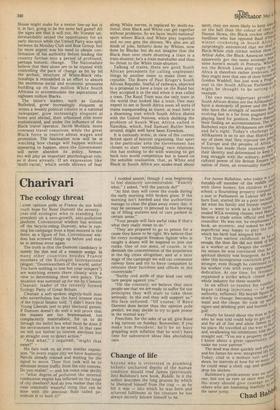Charivari
The ecology threat
Latest opinion polls in France do not hold much hope for Rene Dumont the seventyyear-old ecologist who is standing for president on a zero-growth, anti-pollution platform. Conventional wisdom has written off the bicycle-riding Dumont, who is running his campaign from a boat moored in the Seine, as a figure of fun. Conventional wisdom has screwed things up before and may be in serious error again.
The truth is that the Dumont candidacy is merely the thin end of a massive wedge. In many other countries besides France members of the Ecologist International (slogan: "Doomwatchers of the world, unite! You have nothing to lose but your tempers") are watching events there closely with a view to determining their own policy. The situation was summed up for me by Clement Cleanair, leader of the recently formed Ecology Party of Great Britain.
Cleanair a soft-spoken slightly-built man who nevertheless has the hard intense eyes of the typical fanatic said: "I didn't leave the Young Liberals just to play electoral games. If Dumont doesn't do well it will prove that the masses are too brainwashed, too complacently materialistic, for us to do through the ballot box what must be done if the environment is to be saved. In that case we will not bother to contest elections but go straight over to direct action."
"And what," I inquired, "might that mean?" • His face took on an even steelier expression. "In every major city we have Austerity Patrols already trained and waiting for the signal to move. Their first task will be to eliminate motor traffic from the city centres. Do you realise" — and his voice rose shrilly — "what degree of pollution the internal combustion engine has inflicted on the lungs of city dwellers? And do you realise that the most criminally wasteful thing that can be done with the precious fluid called petroleum is to burn it?" I nodded assent, though I was beginning to feel distinctly uncomfortable. "Exactly what," I asked, "will the patrols do?"
"At first they will cover the roads during the early morning with broken glass. If the warning isn't heeded and the authorities manage to clear the glass away every day, it may be necessary to proceed to the blowing up of filling stations and of cars parked in certain areas."
"Your people will face awful risks if that's what they really mean to do."
"They are prepared to go to prison for a cause they know to be right. We believe that for every ecological freedom fighter who is caught a dozen will be inspired to join our ranks. One of our aims, of course, is to diminish the concentration of the population in the big cities altogether, and at a later stage of the campaign we will cut commuter railway lines and try to force companies to relocate their factories and offices in the countryside."
"Surely civil strife of that kind can only turn people against you."
"On the contrary, we believe that once people see that we are ready to suffer for our principles they will start to take them seriously. In the end they will support us." His face softened. "Of course, if Rene Dumont does better than the opinion polls predict, we may decide to try to gain power in the normal way."
Frenchies, for the sake of us all, give Rene a big turnout on Sunday. Remember, if you make him President, he'll be so busy grappling with inflation that he won't have time for subversive ideas like abolishing cars.
Change of life
Anyone who is interested in plumbing hitherto uncharted depths of the human condition should read James (previously Jim) Bullshine's new book, Riddle. In it the author describes the long process by which he liberated himself from the trap — as he felt it was — into which he was born and achieved fulfilment as the creature he has always secretly known himself to be.
For James Bullshine, who today fortably-off member of the middle
clip( with three homes, his children at 13nor school, a flourishing property comPart" a seat in Parliament as Labour MP for ii burn East, started life as a poor sociali,5„td. did what his family and friends expec" him — went to work as a lathe turner), tended WEA evening classes, read Ma114,40 became a trade union official and councillor. He was not, he emphasises alio book, an eccentric, and indeed he Was,e ws uhpi ec rhf ihc iisa lbiwrtahyhhaadpapsysigtonepdlahyimthe rot Yet from earliest childhood, as reveals, the then Jim did not think of fll'e as a worker at all. Despite the evideactr his senses he was convinced that his spiritual identity was bourgeois. As he gev older this incongruous conviction greW stronger, even though he continued t° his worker role with every aPpearanc; dedication. At one time, for instancv;0 organised a strike which closed d°
whole industry for three months. filet
In an effort to resolve his con,began taking injections — of 01°Ileg authority, influence. His boyish figure „t t slowly to change, becoming rounder 'ow waist and the chops. He took up sill pl cigars and drinking port and learned t°
golf. poi°
Finally he heard about the man in who he was told could help to get riu and for all of Jim and allow James °op his place. He travelled all the way to P and, swallowing his inhibitions, told theiope straight out: "You are a property eleven10, I know about a great opportunity, r make me your partner." The deed was done quickly and eftficbieel:/ and for James his new, integrated Today, clad in a mohair suit and yeu shoes, he marvels at how for so mall' roler drheopcohuilsdawitceahresa cloth cap and delihe Bullshine's predicament was an one, but not as rare as once was t"k-00 His story should give courage t° others who are hesitating fearfully t°
the same jump.
Chad 130/31


































 Previous page
Previous page